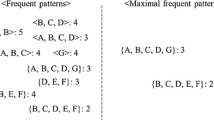Abstract
Frequent pattern mining (FPM) is one of the most important areas in the field of data mining. Several FPM algorithms have been proposed in the literature by many researchers. In most of the approaches, data set is scanned repeatedly in almost every steps of the algorithm that leads to high time complexity. That is why, processing huge amount of data using those algorithms may not be a suitable option. Hence, a novel FPM algorithm is proposed in this paper that improves efficiency by decreasing the time complexity as compared to classical frequent pattern mining algorithm. The proposed FPM algorithm converts the real-world data set into a binary matrix in a single scan, then join operation is performed to obtain the candidate itemsets. Further, AND operation is performed on the candidates to obtain frequent itemsets. Further more, using our proposed algorithm, interesting association rules can be derived.
Access this chapter
Tax calculation will be finalised at checkout
Purchases are for personal use only
Similar content being viewed by others
References
Agrawal, R., Imielinski, T., Swami, A.: Mining association rules between sets of items in large databases. In: Proceedings of the 1993 ACM SIGMOD International Conference on Management of Data, pp. 207–216 (1993)
Al-Maolegi, M., Arkok, B.: An Improved Apriori Algorithm for Association Rules. arXiv preprint arXiv:1403.3948 (2014)
Zaki, M.J.: Scalable algorithms for association mining. IEEE Trans. Knowl. Data Eng., 372–390 (2000)
El-Hajj, M., Zaiane, O.R.: Non recursive generation of frequent K-itemsets from frequent pattern tree representations. In: International Conference on Data Warehousing and Knowledge Discovery, pp. 371–380 (2003)
d Burdick, M.C., Gehrke, J.: Mafia: a maximal frequent itemset algorithm for transactional databases. In: Proceedings 17th International Conference on Data Engineering, pp. 443–452 (2001)
Baralis, E., Cerquitelli, T., S.C.A.G.: P-mine: parallel itemset mining on large datasets. In: 2013 IEEE 29th International Conference on Data Engineering Workshops (ICDEW), pp. 266–271 (2013)
Sahoo, A., Senapati, R.: A Boolean load-matrix based frequent pattern mining algorithm. In: IEEE International Conference on Artificial Intelligence and Signal Processing, India, pp. 1–5 (2020)
Feng, D., Zhu, L., Zhang, L.: Research on improved Apriori algorithm based on MapReduce and HBase. In: IEEE International Conference on Computational Intelligence and Computing Research,Coimbatore, India (2016)
Yang, Q., Fu, Q., Wang, C., Yang, J.: A matrix-based Apriori algorithm improvement. In: International Conference on Data Science in Cyberspace, Guangdong, China (2018)
Xiao, M., Zhou, Y.Y., Pan, S.: Research on improvement of Apriori algorithm based on marked transaction compression. In: IEEE 2nd Advanced Information Technology, Electronic and Automation Control Conference,Chongqing, China, pp. 1067–1071 (2017)
Yu, N., Yu, X., Shen, L., Yao, C.: Using the improved Apriori algorithm based on compressed matrix to analyze the characteristics of suspects. ICIC Expre. Lett. Part B, Appl. Int. J. Res. Surv. 2469–2475 (2015)
Huang, Y., Lin, Q., Li, Y.: Apriori-Bm algorithm for mining association rules based on bit set matrix. In: IEEE Advanced Information Management, Communicates, Electronic and Automation Control Conference (IMEC), Xi’an, China, pp. 2580–2584 (2018)
Chrn, Z., Cai, S., Song, Q., Zhu, C.: An improved Apriori algorithm based on pruning optimization and transaction reduction. In: 2nd International Conference on Artificial Intelligence, Management Science and Electronic Commerce, ZHENGZHOU, China, pp. 1908–1911 (2011)
El-Mouadib, F.A., ferjani, K.S.A.: The performance of the Apriori-dhp algorithm with some alternative measures. In: 8th Conference on Advances in Decision Systems (ASD 2014) at Hammamet, Tunisia (2014)
Ghafari, S.M., Tjortjis, C.: A Survey on Association Rules Mining using Heuristics. Wiley Interdisciplinary Reviews: Data Mining and Knowledge Discovery, p. e1307 (2019)
Author information
Authors and Affiliations
Corresponding author
Editor information
Editors and Affiliations
Rights and permissions
Copyright information
© 2021 The Author(s), under exclusive license to Springer Nature Singapore Pte Ltd.
About this paper
Cite this paper
Patro, P.P., Senapati, R. (2021). Advanced Binary Matrix-Based Frequent Pattern Mining Algorithm. In: Udgata, S.K., Sethi, S., Srirama, S.N. (eds) Intelligent Systems. Lecture Notes in Networks and Systems, vol 185. Springer, Singapore. https://doi.org/10.1007/978-981-33-6081-5_27
Download citation
DOI: https://doi.org/10.1007/978-981-33-6081-5_27
Published:
Publisher Name: Springer, Singapore
Print ISBN: 978-981-33-6080-8
Online ISBN: 978-981-33-6081-5
eBook Packages: Intelligent Technologies and RoboticsIntelligent Technologies and Robotics (R0)




